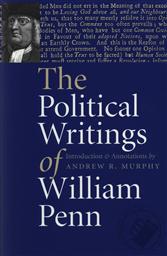The Political Writings of William Penn (Book/ Paperback)
by William PennProduct Overview
William Penn played a crucial role in the articulation of religious liberty as a philosophical and political value during the second half of the seventeenth century and as a core element of the classical liberal tradition in general. Penn was not only one of the most vocal spokesmen for liberty of conscience in Restoration England, but he also oversaw a great colonizing endeavor that attempted to instantiate his tolerationist commitments in practice. His thought has relevance not only for scholars of English political and religious history, but also for those who are interested in the foundations of American religious liberty, political development, and colonial history. This volume illuminates the origins and development of Penn’s thought by presenting, for the first time, complete and annotated texts of all his important political works.
Penn’s early political writings illuminate the Whig understanding of English politics as guided by the ancient constitution (epitomized by Magna Charta and its elaboration of English native rights). The ancient constitution symbolized, for Penn and other Whigs, a balanced governing relationship between King and Parliament, established from antiquity and offering a standard against which to judge the actions of particular Parliaments. The values of liberty, property, and consent (as represented by Parliament) provide the basis for Penn’s advocacy of liberty of conscience in Restoration England. During the 1660s and 1670s, Penn used his social prominence as well as the time afforded him by several imprisonments to compose a number of works advocating religious toleration and defending the ancient constitution as a guarantor of popular liberties. In the 1680s, Penn’s political thought emphasized the substantive importance of toleration as a fundamental right and the civil magistrate’s duty to grant such freedom regardless of those interests in society (e.g., the Church of England, Tories in Parliament) who might oppose it. His social status, indefatigable energy for publication, and command of biblical and historical sources give Penn’s political writings a twofold significance: as a window on toleration and liberty of conscience, perhaps the most vexing issue of Restoration politics; and as part of a broader current of thought that would influence political thought and practice in the colonies as well as in the mother country.
William Penn (1644–1718) lived during the two great political and religious upheavals in seventeenth-century England: the Civil Wars of the 1640s and the 1688 Revolution. He was expelled from Christ Church College, Cambridge, for religious nonconformity, and in 1667 he converted to Quakerism. After his conversion, he worked as a preacher, writer, and spokesman for the Quakers, promoting religious liberty and attempting to advance the interests of the Quakers in the American colonies.
Table of Contents
Acknowledgments ix
Introduction
William Penn: His Life, His Times, and His Work xi
Notes on Texts and Annotations xxv
Chronology of Penn’s Life and Times xxvii
Part I
Foundations: The Ancient Constitution and English Liberties
1 The People’s Ancient and Just Liberties Asserted (1670) 3
2 England’s Present Interest Considered (1675) 22
Part II
Penn’s Argument for Religious Liberty
3 The Great Case of Liberty of Conscience (1670) 79
4 One Project for the Good of England (1679) 120
5 An Address to Protestants of All Perswasions (1679) 137
6 A Brief Examination and State of Liberty Spiritual (1681) 272
7 A Perswasive to Moderation to Church-Dissenters (1686) 289
8 Good Advice to the Church of England, Roman-Catholick, and Protestant Dissenter (1687) 330
Part III
General Principles and Specific Events
9 The Proposed Comprehension Soberly, and Not Unseasonably, Consider’d (1672) 379
10 England’s Great Interest, in the Choice of This New Parliament (1679) 384
11 A Letter from a Gentleman in the Country, to His Friends in London, upon the Subject of the Penal Laws an
About the Author(s)
William Penn
William Penn (1644 - 1718) was an English real estate entrepreneur, philosopher, and founder of the Province of Pennsylvania, the English North American colony and the future Commonwealth of Pennsylvania. He was an early champion of democracy and religious freedom, notable for his good relations and successful treaties with the Lenape Indians. Under his direction, the city of Philadelphia was planned and developed. In 1681, King Charles II, handed over a large piece of his American land holdings to William Penn to satisfy a debt the king owed to Penn's father (Admiral William Penn). This land included present-day Pennsylvania and Delaware. Penn immediately sailed to America and his first step on American soil took place in New Castle in 1682.
List Price: $14.50
Our Price: $12.00
You Save:
$2.50(17%)
+ Free Shipping w/ $45 min. purchase
Category: History
Format: Book (Paperback)
Publisher: Liberty Fund Inc
Date Published: Jan 01, 2002
ISBN: 9780865973183
SKU: LT-1214
Dimensions: 6.00 x 9.00 x 1.25 (in)
Weight: 27.10 oz










